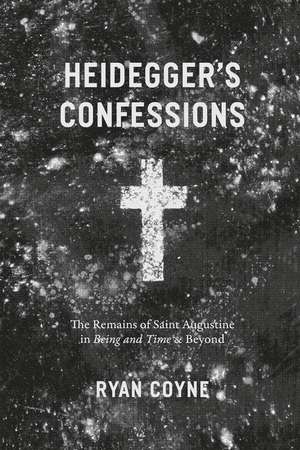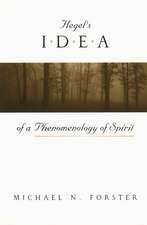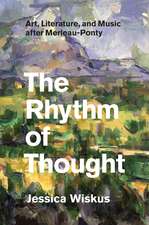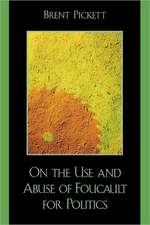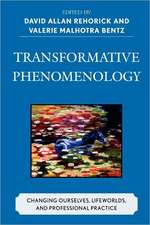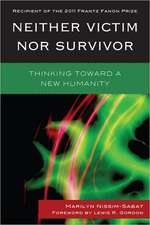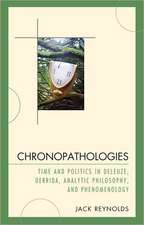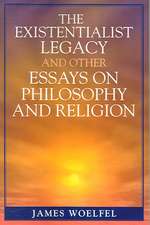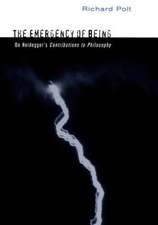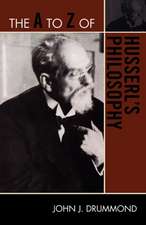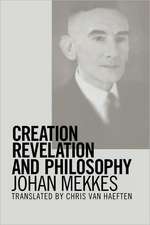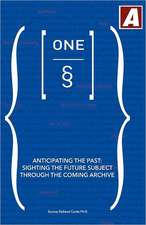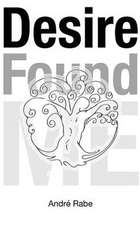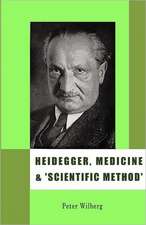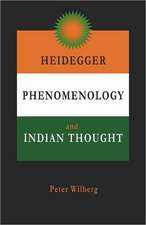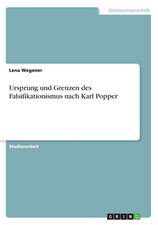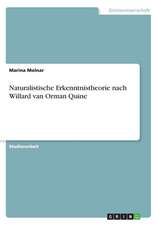Heidegger's Confessions: The Remains of Saint Augustine in "Being and Time" and Beyond: Religion and Postmodernism
Autor Ryan Coyneen Limba Engleză Paperback – 27 iul 2016
Although Martin Heidegger is nearly as notorious as Friedrich Nietzsche for embracing the death of God, the philosopher himself acknowledged that Christianity accompanied him at every stage of his career. In Heidegger's Confessions, Ryan Coyne isolates a crucially important player in this story: Saint Augustine. Uncovering the significance of Saint Augustine in Heidegger’s philosophy, he details the complex and conflicted ways in which Heidegger paradoxically sought to define himself against the Christian tradition while at the same time making use of its resources.
Coyne first examines the role of Augustine in Heidegger’s early period and the development of his magnum opus, Being and Time. He then goes on to show that Heidegger owed an abiding debt to Augustine even following his own rise as a secular philosopher, tracing his early encounters with theological texts through to his late thoughts and writings. Bringing a fresh and unexpected perspective to bear on Heidegger’s profoundly influential critique of modern metaphysics, Coyne traces a larger lineage between religious and theological discourse and continental philosophy.
Coyne first examines the role of Augustine in Heidegger’s early period and the development of his magnum opus, Being and Time. He then goes on to show that Heidegger owed an abiding debt to Augustine even following his own rise as a secular philosopher, tracing his early encounters with theological texts through to his late thoughts and writings. Bringing a fresh and unexpected perspective to bear on Heidegger’s profoundly influential critique of modern metaphysics, Coyne traces a larger lineage between religious and theological discourse and continental philosophy.
Din seria Religion and Postmodernism
-
 Preț: 230.29 lei
Preț: 230.29 lei -
 Preț: 115.44 lei
Preț: 115.44 lei -
 Preț: 160.17 lei
Preț: 160.17 lei -
 Preț: 215.22 lei
Preț: 215.22 lei -
 Preț: 273.06 lei
Preț: 273.06 lei -
 Preț: 327.41 lei
Preț: 327.41 lei -
 Preț: 291.10 lei
Preț: 291.10 lei -
 Preț: 265.27 lei
Preț: 265.27 lei -
 Preț: 289.96 lei
Preț: 289.96 lei -
 Preț: 286.68 lei
Preț: 286.68 lei -
 Preț: 270.14 lei
Preț: 270.14 lei -
 Preț: 231.93 lei
Preț: 231.93 lei -
 Preț: 292.08 lei
Preț: 292.08 lei -
 Preț: 261.66 lei
Preț: 261.66 lei -
 Preț: 224.84 lei
Preț: 224.84 lei -
 Preț: 237.25 lei
Preț: 237.25 lei -
 Preț: 273.42 lei
Preț: 273.42 lei -
 Preț: 292.28 lei
Preț: 292.28 lei -
 Preț: 317.33 lei
Preț: 317.33 lei -
 Preț: 273.06 lei
Preț: 273.06 lei - 21%
 Preț: 483.66 lei
Preț: 483.66 lei - 21%
 Preț: 334.54 lei
Preț: 334.54 lei - 17%
 Preț: 102.53 lei
Preț: 102.53 lei - 22%
 Preț: 482.75 lei
Preț: 482.75 lei - 15%
 Preț: 259.29 lei
Preț: 259.29 lei - 18%
 Preț: 175.92 lei
Preț: 175.92 lei
Preț: 233.25 lei
Nou
Puncte Express: 350
Preț estimativ în valută:
44.63€ • 46.72$ • 36.93£
44.63€ • 46.72$ • 36.93£
Carte tipărită la comandă
Livrare economică 05-19 aprilie
Preluare comenzi: 021 569.72.76
Specificații
ISBN-13: 9780226419077
ISBN-10: 022641907X
Pagini: 312
Dimensiuni: 152 x 229 x 25 mm
Greutate: 0.45 kg
Ediția:1
Editura: University of Chicago Press
Colecția University of Chicago Press
Seria Religion and Postmodernism
ISBN-10: 022641907X
Pagini: 312
Dimensiuni: 152 x 229 x 25 mm
Greutate: 0.45 kg
Ediția:1
Editura: University of Chicago Press
Colecția University of Chicago Press
Seria Religion and Postmodernism
Notă biografică
Ryan Coyne is assistant professor of the philosophy of religions and theology at the University of Chicago Divinity School.
Cuprins
Acknowledgments
Introduction
Chapter 1: Heidegger’s Paul
Chapter 2: The Cogito Out-of-Reach
Chapter 3: The Remains of Christian Theology
Chapter 4: Testimony and the Irretrievable in Being and Time
Chapter 5: Temporality and Transformation, or Augustine through the Turn
Chapter 6: On Retraction
Conclusion: Difference and De-Theologization
Notes
Selected Bibliography
Index
Introduction
Chapter 1: Heidegger’s Paul
Chapter 2: The Cogito Out-of-Reach
Chapter 3: The Remains of Christian Theology
Chapter 4: Testimony and the Irretrievable in Being and Time
Chapter 5: Temporality and Transformation, or Augustine through the Turn
Chapter 6: On Retraction
Conclusion: Difference and De-Theologization
Notes
Selected Bibliography
Index
Recenzii
“Coyne provides a rich exploration of ‘Heidegger’s own portrayals of Augustinian concepts,’ as he writes in the introduction. He traces these Augustinian concepts through Heidegger’s work to reveal the ways in which they inform some of Heidegger’s most fundamental themes. Coyne argues that Heidegger’s rearticulation of certain themes throughout his lifetime reveals the centrality of those themes and is reason enough to take them up carefully. Coyne does exactly that with the concept of ‘being-there,’ as presented in early Heidegger, and of ‘de-theologization,’ which appears in Heidegger’s writings of the 1920s. . . . Articulating his argument with care, Coyne brings new light to Heidegger and theology. . . . Highly recommended.”
“Coyne’s new study of Heidegger’s extended, complex, and fluctuating relation to Augustine is an excellent piece of work that proceeds through a series of close critical readings of key texts extending from the early post–World War I lectures on religious life through to the 1957 paper on ‘The Onto-theo-logical Constitution of Metaphysics.’ Taking in central elements of Being and Time, the Contributions to Philosophy, the critique of Nietzsche, and the return to the Pre-Socratics, the apparently narrow focus on Augustine is used to develop an overall reading of Heidegger’s deeply conflicted relation to religion.”
"Anyone tempted to take Heidegger’s occasional references to Augustine as marginal asides, worthy of curiosity or perhaps biographical but not philosophical interest should read Ryan Coyne’s Heidegger’s Confessions. Coyne’s examination of the Heideggerian texts and their histories makes clear that a confrontation with Augustine is indispensable to Heidegger’s elaboration of the most important questions, issues, and phenomena the master treated. . . . What is perhaps most impressive about Heidegger’s Confessions is the erudition and philological care Coyne exercises in documenting the presence of Augustine in the Heideggerian corpus. Coyne’s analyses are meticulous, his mastery of the texts and their histories compelling. These are indispensable virtues in the reading of a corpus as dense and complicated as Heidegger’s."
